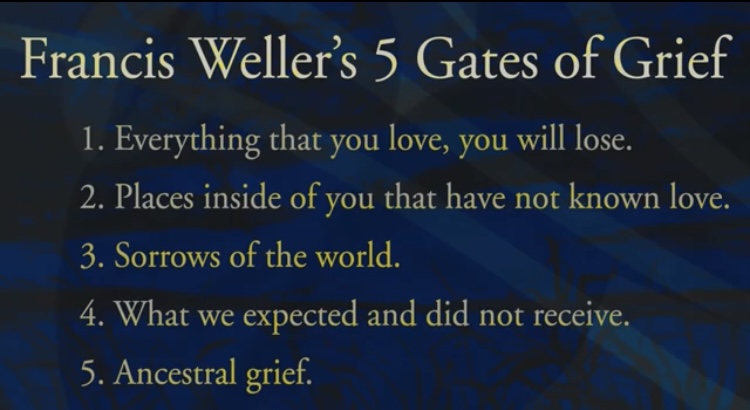One of my Twitter mutuals suggested I explore the work of psychiatrist Francis Weller and his work on grief. I spent two hours with his lecture and another hour on the writing and exercises explored in this talk available on YouTube. I found his five gates of grief particularly helpful.

I have been exploring my childhood emotions and the unconscious way those experiences still affect me. Using Weller’s gates of grief I see I need to grieve but also understand these patterns and what I gave up as a child so I can see what to let go now as an adult but also understand what gifts it has left me with.
In the framing of the second gate, I felt abandoned and unloved as a child. There were parts of me that were never loved. It was a challenge to get attention. This has left my inner childhood fearful that love is unreliable, attention is fleeting and abandonment is always to be feared.
Francis Weller asked what are these lessons or emotional complexes protecting? Why do I feel this way and what did I gain? At the heart of every experience is a jewel of great price. I was protecting and nurturing the capacity to get my father’s attention.
As a small child I didn’t understand why he didn’t pay attention to me for the things I wanted and I liked. So I found ways to get his attention through the things he liked. I developed the expectation I would be ignored. I wouldn’t be paid attention to unless I made myself appealing. So I learned to cut deals to be paid attention. I learned useful skills this way. A pearl of great price indeed. But I was also giving up the idea I’ll be loved just for being his child.
That all the things I did to change myself to be paid attention to and to be loved never ultimately got me what I needed when I was a small child is a loss I must grieve. I’ll never be able to go back and feel like I was wanted. No change I made fixed it either. I must mourn the second gate.
To leave behind these coping mechanisms or emotional complexes, to grieve them, is to admit that they did not work. I cannot change that I felt I was not wanted or loved. They have nothing to offer me now. I have to grieve the lack of a loved childhood to love myself in adulthood.
But it is not a bad thing. Francis Well shares that the other hand of grief is gratitude. In one hand we hold grief and on the other gratitude is in our other palm. So I recognize I have gratitude that my childhood gave me the skills to see what others want. I see what they are looking to find. I know what others are manifesting. I see what others are building and making and wanting. I learned to see the power and magic of others so I can hold space for them. And I learned how to golf. Useful skills indeed.
I grieve that this was my tool for attention and love as a child. I deserved love and attention just for existing as a child. But I am grateful for what it has given me as well.